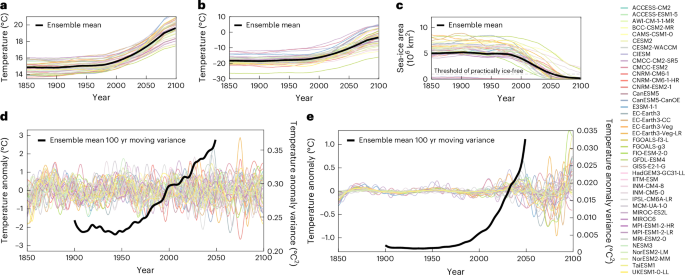Emergence of a climate oscillation in the Arctic Ocean due to global warming
IF 29.6
1区 地球科学
Q1 ENVIRONMENTAL SCIENCES
引用次数: 0
Abstract
Global warming is expected to be able to trigger abrupt transitions in various components of the climate system. Most studies focus on abrupt changes in the mean state of the system, while transitions in climate variability are less well understood. Here, we use multimodel simulations to show that sea-ice loss in the Arctic can trigger a critical transition in internal variability that leads to the emergence of a new climate oscillation in the Arctic Ocean. The intensified air–sea interaction due to sea-ice melt causes an oscillatory behaviour of surface temperatures on a multidecadal timescale. Our results suggest that a new mode of internal variability will emerge in the Arctic Ocean when sea ice declines below a critical threshold. Abrupt transitions in the climate system are discussed mostly in terms of mean state changes. Here, the authors use simulations to show that a decline in Arctic sea ice can lead to a new multidecadal mode of surface temperatures in the Arctic Ocean.


全球变暖导致北冰洋出现气候振荡
全球变暖预计会引发气候系统各组成部分的突然转变。大多数研究侧重于系统平均状态的突然变化,而对气候变率的转变则了解较少。在这里,我们利用多模型模拟表明,北极海冰的消失会引发内部变率的关键转变,从而导致北冰洋出现新的气候振荡。海冰融化导致的海气相互作用的加强会引起地表温度在多年代时间尺度上的振荡行为。我们的研究结果表明,当海冰减少到临界阈值以下时,北冰洋将出现一种新的内部变化模式。
本文章由计算机程序翻译,如有差异,请以英文原文为准。
求助全文
约1分钟内获得全文
求助全文
来源期刊

Nature Climate Change
ENVIRONMENTAL SCIENCES-METEOROLOGY & ATMOSPHERIC SCIENCES
CiteScore
40.30
自引率
1.60%
发文量
267
审稿时长
4-8 weeks
期刊介绍:
Nature Climate Change is dedicated to addressing the scientific challenge of understanding Earth's changing climate and its societal implications. As a monthly journal, it publishes significant and cutting-edge research on the nature, causes, and impacts of global climate change, as well as its implications for the economy, policy, and the world at large.
The journal publishes original research spanning the natural and social sciences, synthesizing interdisciplinary research to provide a comprehensive understanding of climate change. It upholds the high standards set by all Nature-branded journals, ensuring top-tier original research through a fair and rigorous review process, broad readership access, high standards of copy editing and production, rapid publication, and independence from academic societies and other vested interests.
Nature Climate Change serves as a platform for discussion among experts, publishing opinion, analysis, and review articles. It also features Research Highlights to highlight important developments in the field and original reporting from renowned science journalists in the form of feature articles.
Topics covered in the journal include adaptation, atmospheric science, ecology, economics, energy, impacts and vulnerability, mitigation, oceanography, policy, sociology, and sustainability, among others.
 求助内容:
求助内容: 应助结果提醒方式:
应助结果提醒方式:


